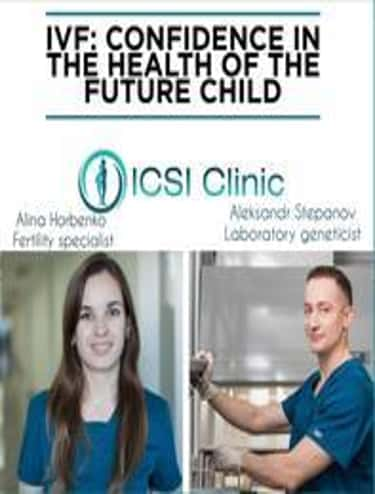IVF: confidence in the health of the future child

‘IVF: confidence in the health of the future child.’ — told geneticist and embryologist of the ICSI Clinic, Alina Horbenko
(1) Which way of the health evaluation does an embryo pass?
ICSI Clinic embryologists observe the embryo development for five, six, less often for seven days. From the moment when the selected, externally ideal spermatozoa are injected into the cytoplasm of the egg, and until the blastocyst forms. The day after fertilization, the stage of the pronucleus is monitored, when the paternal and maternal chromosomes are separately formed in the egg. Then the chromosomes merge, divide, and the process of crushing a new cell into 2–4–8 and more blastomeres begins. The day of ICSI conducting is considered to be day zero. The first day is the development of pronuclei. The second day is the development of a four–blastomeric embryo. The third one — the eight–blastomeric embryo. Fourth — morula, where 10–12–16–20 blastomeres merge. The fifth day — blastocyst stage. Sometimes it appears not on the fifth, but on the sixth or seventh day.
(2) How do embryologists evaluate the health of the unborn child?
At each stage, embryologists evaluate the correct development and compliance with the norms of the elements of the embryo. As mentioned above, the first stage is pronucleus. Then comes the blastomeres stage. Moreover, the shape of the blastomeres and their sizes in relation to each other may already indicate any disturbances in the development of the embryo. That the professionalism of an embryologist is a major factor in understanding where the norm, and where there are deviations. Evaluation of the embryo at the blastocyst stage is very important as it is at this stage that the transfer is carried out. Trophectoderm cells are the future chorion and placenta, and the embryoblast forms the embryo. According to the number of cell masses, embryos are divided into categories: A, B, C, and D. And also, depending on the degree of development and location of the zona pellucida protein-membrane, the number 1,2,3,4,5,6 is indicated. The key point is the assessment of fragmentation. So–called small or large fragments of blastomeres that do not contain a chromosome apparatus. They cannot continue to develop and produce normal blastomeres. The more fragments in the embryo, the worse the prognosis for it. It is also important in which section these fragments are located. Nowadays, the fighting against fragmentation became a problem of global embryology.
(3) How many assessment parameters are there?
To obtain maximum information about the embryo, its appearance, number of cells, the presence of fragmentation, and its severity are evaluated. In addition, the results of the chromosomal analysis of embryos are conducted. When is FISH or NGS performed?
(4) How long does the diagnosis take?
External assessment of the embryo takes approximately 5–10 minutes, sometimes less. During the procedure, a video is recorded, which is sent to the patients. The evaluation of the chromosome apparatus lasts longer. The result of FISH diagnostics can be obtained in our own laboratory within 1–14 days.
(5) What can genetics predict?
In the laboratory, genetics conduct research according to indications. They include preimplantation genetic testing; prenatal diagnosis of the fetus to detect chromosomal pathology, gene mutation; as well as a cytogenetic analysis of both spouses to exclude the genetic factor of reproductive dysfunction. If patients with already known specific genetic pathology enter the program, we can determine its presence in the embryo in advance. A trophectoderm biopsy is performed at the blastocyst stage and the resulting material is sent to the genetic laboratory. Embryos are stored frozen at this time. Thus, a healthy embryo can be chosen right after having received the result of genetic testing.
(6) How many geneticists are there at an ICSI clinic?
There are 3 professional geneticists among the members of the ICSI clinic team. The bulk of genetic research is carried out in the clinic’s own laboratory.